HUNGARIAN ACACIA
[post-fact documentary theatre]
with Bence György Pálinkás
Trafó House of Contemporary Arts
Premiere at 24.05.2017.
Botanical saga of an alien species that became Hungary’s most patriotic tree.
The black locust or false acacia tree, considered the most Hungarian tree by 63% of the Hungarian population, arrived 300 years ago from North America, and took root in a Hungarian aristocrat’s garden. After centuries, this exceptionally persistent and adaptive species outpaced all native types to become Hungary’s most widespread tree. Nevertheless, the black locust is divisive and triggers a range of emotions among Hungarians. Many environmentalists dislike and criticize the tree, while thousands of other people earn a living from it.
In 2014, an EU regulation was passed on the prevention, eradication and management of several alien species. Ecological issues suddenly became mixed up with politics. Surprisingly, the ruling party of Hungary, led by Viktor Orbán, despite previously suggesting eradicating the invasive alien black locust tree, voted against the regulation, and used the case as an argument in their domestic anti-Brussels campaign, saying “We send this message to Brussels! We are protecting Hungarian land, free pálinka distillation, honey and the black locust-tree!”
Hungarian Acacia tells how this native American tree became a national and political symbol in Hungary. But how can a tree, become subject to political debates? How do political actors use, re-mix or even manipulate ecological facts? Having examined the story of the black locust, Kelemen and Pálinkás launched a movement aiming to “rebrand” this plant as a symbol of open society. Members organised black locust planting events at politically symbolic locations in order to propagate a liberal, inclusive ideal of community. “Anybody who can take root in Hungarian soil can be Hungarian.” The performers re-enact these actions on stage, play music, recite political speeches and present the group’s future plans. The question is whether their movement is going to take root? Are they going to be as persistent as the black locust trees now thriving in dry flatlands and abandoned mines?



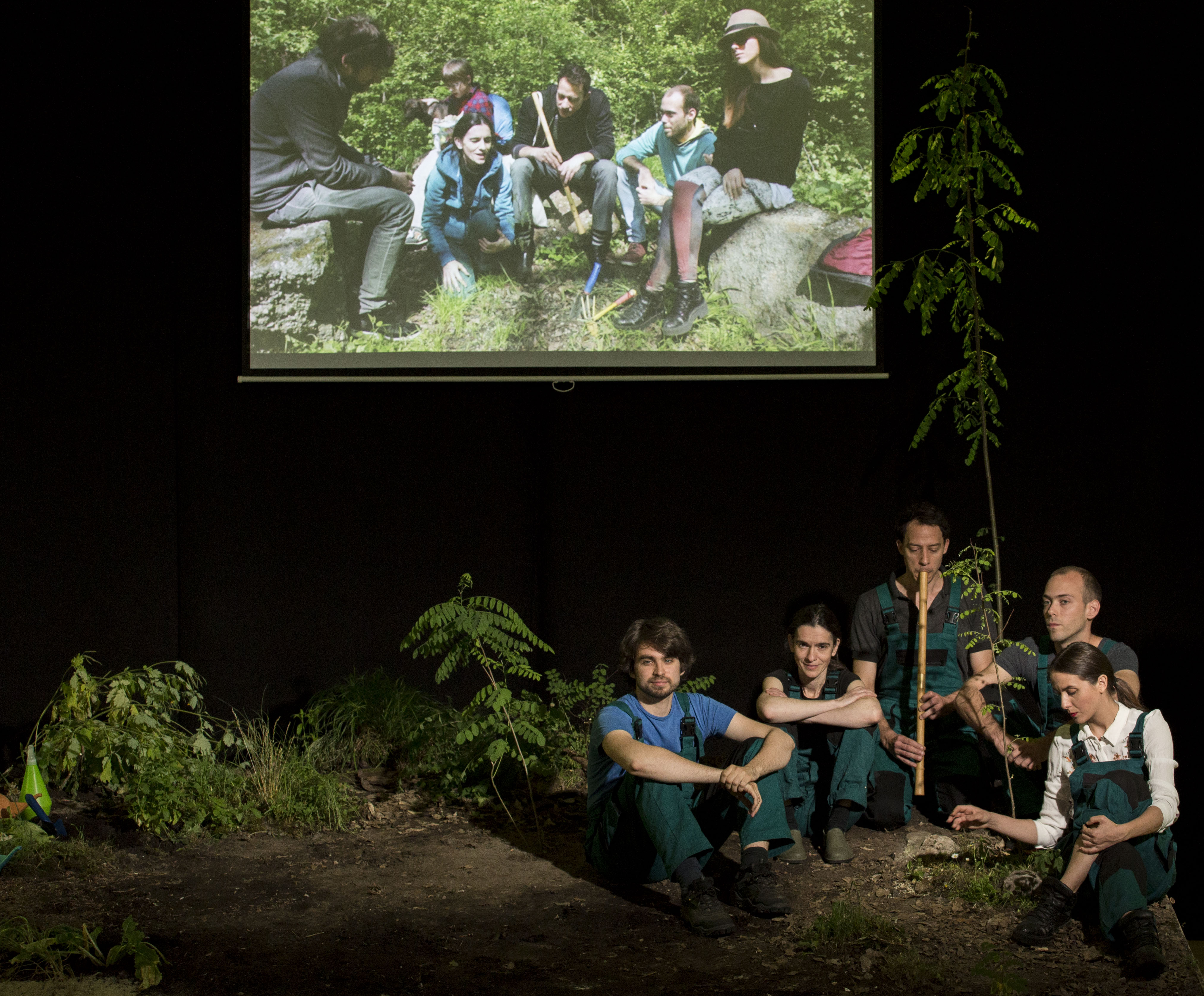


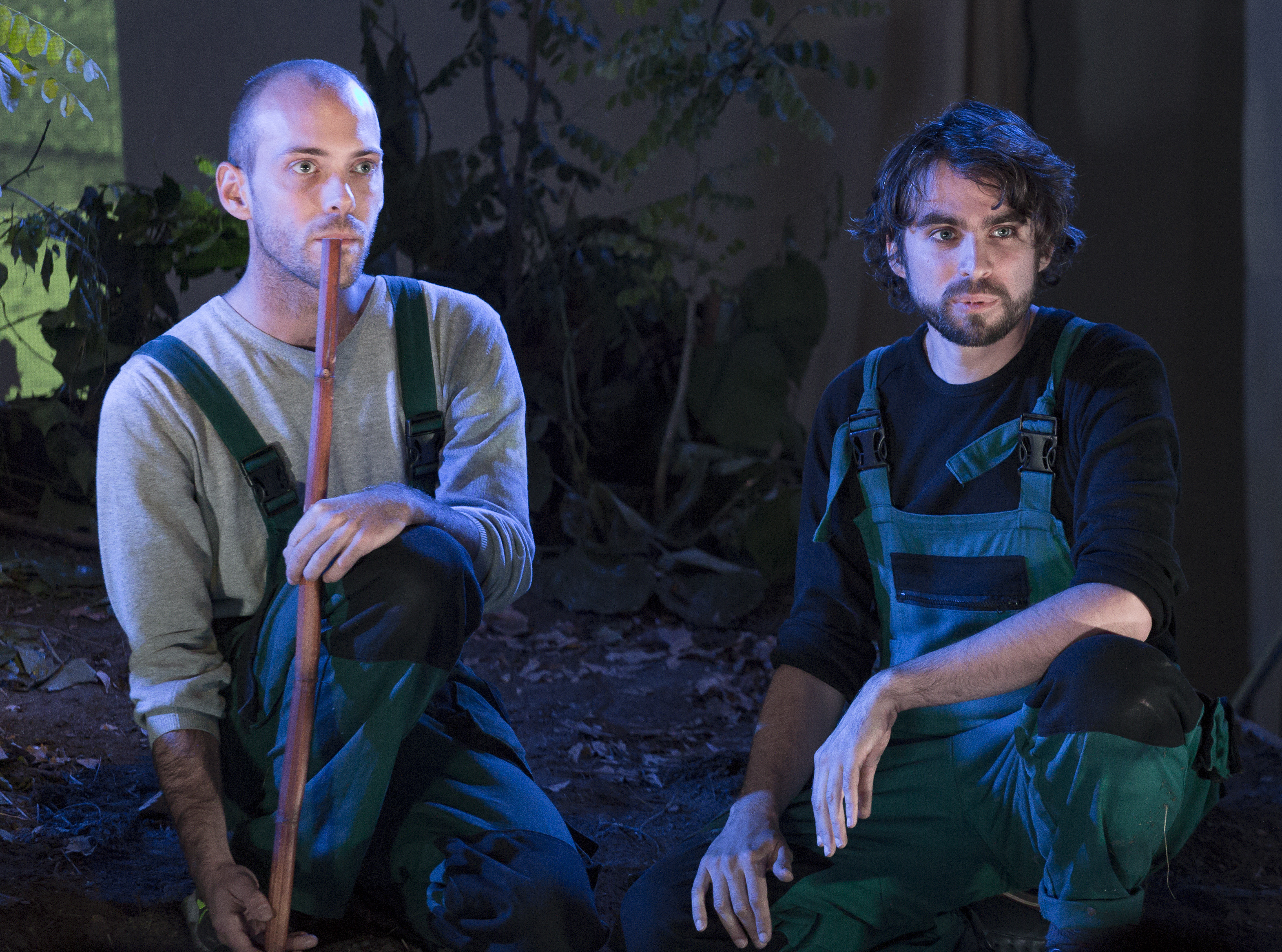

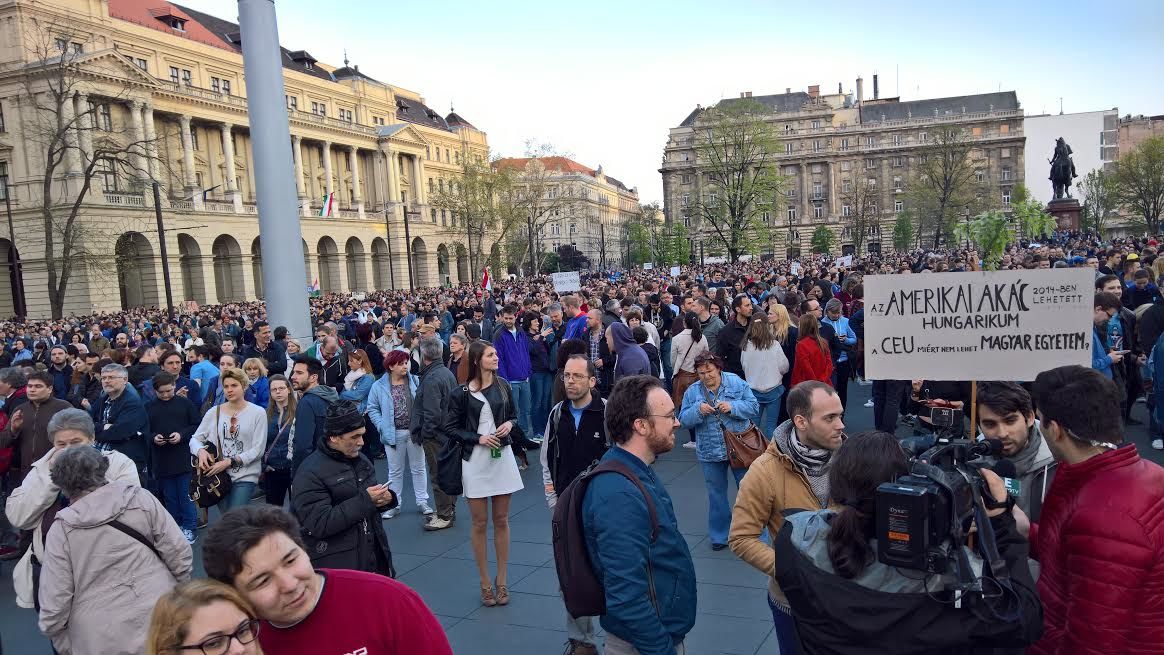
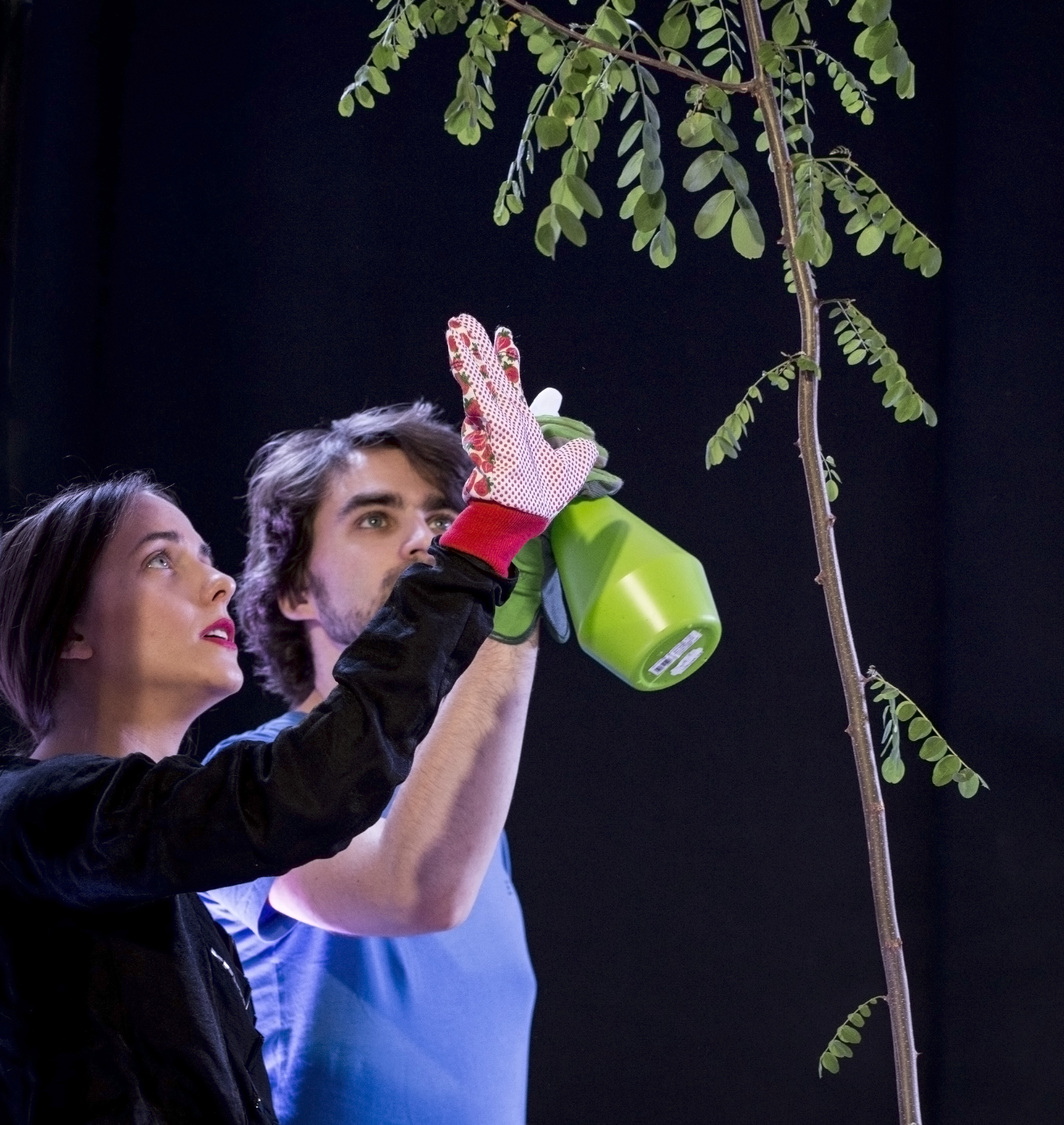
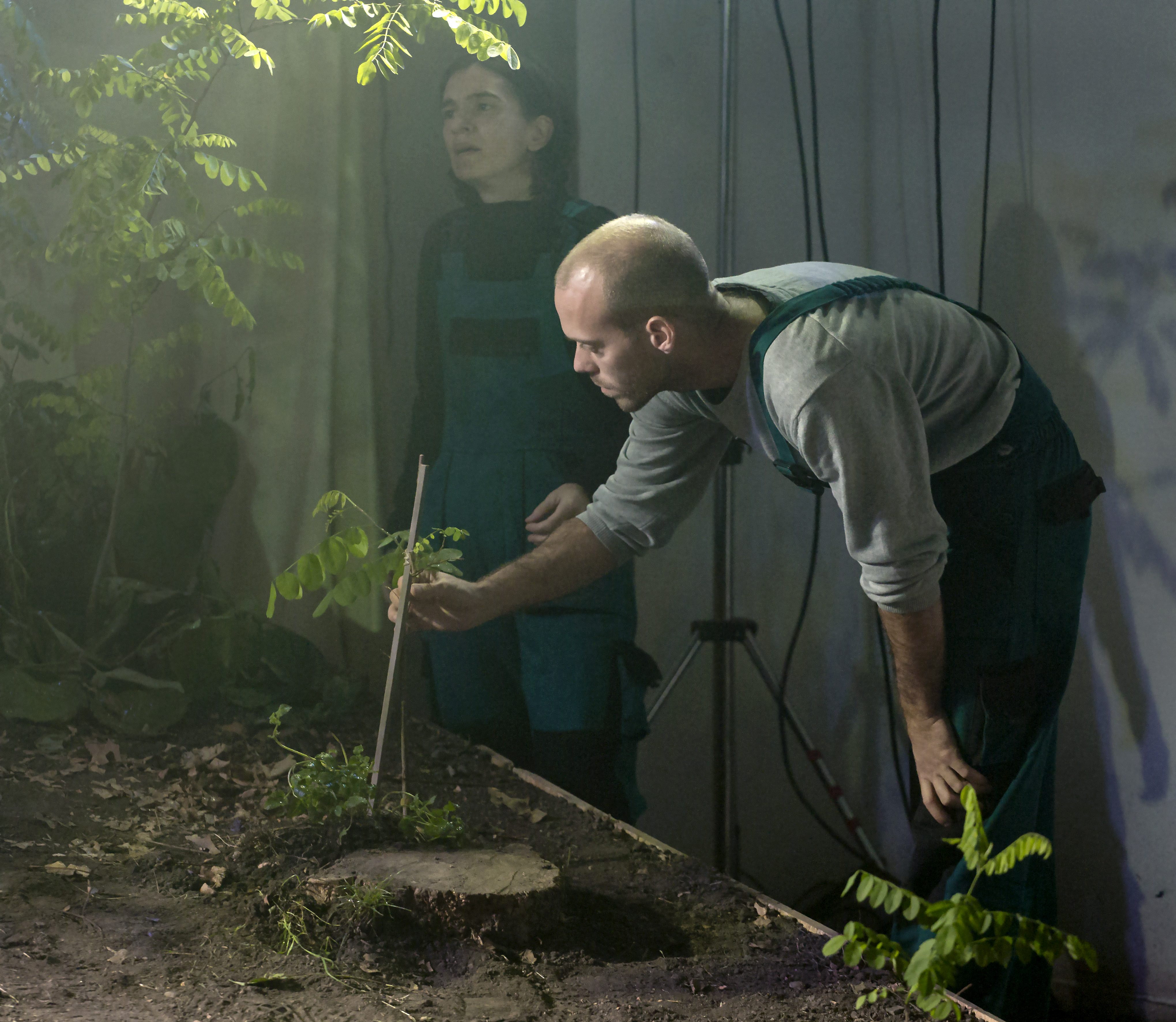




“The performance uses the cultural history of the acacia tree to question current concepts of nationalism. (…) use of humour is its most important weapon.”
(Gabriella Schuller, European Stages)
“…Hungarian Acacia, the most cunning, wittiest, most poetic and trenchantly political production of the 4th edition of dunaPart.”
(Esther Slevogt, nachtkritik.de)
“My personal favourite was Hungarian Acacia, that was a complete surprise for me, I have not known anything about this group or the venue. This performance deals with problems like migration or isolation. I would not say it was better than the others, rather, that it was enchanting. It had what I call Schlingensief-twist, that one cannot decide whether the facts presented as part of the performance aretrue or not.”
(Thomas Irmer, Theater der Zeit, quoted from a discussion about dunaPart platform)
“To understand the performance, one doesn't need any special botanical knowledge; the production doesn’t take sides in ecological questions either. But it does point out clearly how various ideologies that use scientific facts in their arguments (taken out of context) exploit the black locust tree in order to prove their views or justify their own personal interests.”
(Kitti Gosztola, Artmagazin)
FESTIVALS:
2017 – dunaPart4 Platform, Budapest
2018 – Deszka Festival, Debrecen, Hungary
2018 – Off Europa Festival, Leipzig-Dresden-Chemnitz, Germany
2018 – Bánkitó Festival, Hungary
2018 – Thealter Festival, Szeged, Hungary (Critics’ Choice Award)
2018 – Theaterfestival Basel, Switzerland
2018 – Festival Divadelná Nitra, Slovakia
2019 – BOZAR Brussels, Belgium
2019 – Rehearsal for Truth Theater Festival, Václav Havel Library Foundation, New York, United States (lecture-performance)
2019 – Unfuck My Future Festival, Mousonturm, Frankfurt, Germany
2019 – SPIELART, Munich, Germany
2019 – Palm Off Fest, Prague, Czech Republic
2019 – Fabricia de Pensule, Cluj-Napoca, Romania
2020 – Wiener Festwochen reframed, Go Hungarian Acacia! Go Hungarians! (commissioned video)
2021 – 3rd NTNG International Forest Festival, Thessaloniki, Greece (online stream)
2022 – Voices International Theater Festival, Jersey City Theater Center, United States
2022 – Rehearsal for Truth Theater Festival, Vaclav Havel Library Foundation, Bohemian National Hall, New York, United States
Performers: Angéla Eke, Katalin Homonnai, Kristóf Kelemen, Márton Kristóf, Bence György Pálinkás
Music: Márton Kristóf
Assistant Director: Anita Totobé
Actors’ coordination: Réka Judit Kiss, Eszter Szinai
Set construction: Dániel Balázsi, Fanni Hegedűs
Light and Sound Technician: Mátyás Major
English translation: Miklós Zsámboki
German translation: Gábor Miklós Thury
Production Manager, Contact Person: Judit Böröcz
Directors, Concept: Kristóf Kelemen, Bence György Pálinkás
Co-producers: Trafó House of Contemporary Arts, Workshop Foundation
Supported by: Trafó House of Contemporary Arts, FÜGE Productions – Independently Together, Workshop Foundation Budapest, Ministry of Human Capacities, National Cultural Fund, Jurányi Incubator House
Special thanks: Orsolya Barna, Seth Coleman, Krisztina Csányi, Lilla Eredics, György Gazsó, Kitti Gosztola, Dániel Lovas, Gábor Nagypál, András Pál, Júlia Regényi, Balázs Semsei (Norwell/Farbwechsel Records), György Sipos, Attila Szirtes, Judit Tarr, Jurányi Production House, Sonidus Archive, Lázár Pika Karácsony, Gábor Mojszi Szőcs, Off Europa Festival
Music: Márton Kristóf
Assistant Director: Anita Totobé
Actors’ coordination: Réka Judit Kiss, Eszter Szinai
Set construction: Dániel Balázsi, Fanni Hegedűs
Light and Sound Technician: Mátyás Major
English translation: Miklós Zsámboki
German translation: Gábor Miklós Thury
Production Manager, Contact Person: Judit Böröcz
Directors, Concept: Kristóf Kelemen, Bence György Pálinkás
Co-producers: Trafó House of Contemporary Arts, Workshop Foundation
Supported by: Trafó House of Contemporary Arts, FÜGE Productions – Independently Together, Workshop Foundation Budapest, Ministry of Human Capacities, National Cultural Fund, Jurányi Incubator House
Special thanks: Orsolya Barna, Seth Coleman, Krisztina Csányi, Lilla Eredics, György Gazsó, Kitti Gosztola, Dániel Lovas, Gábor Nagypál, András Pál, Júlia Regényi, Balázs Semsei (Norwell/Farbwechsel Records), György Sipos, Attila Szirtes, Judit Tarr, Jurányi Production House, Sonidus Archive, Lázár Pika Karácsony, Gábor Mojszi Szőcs, Off Europa Festival